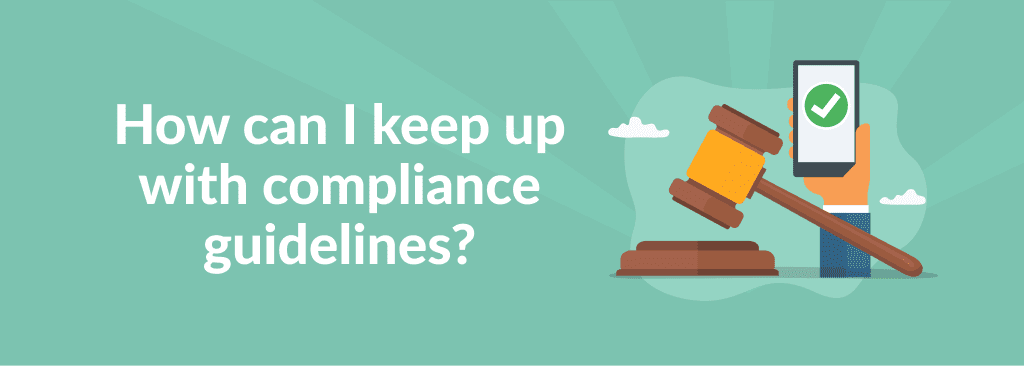How Can I Keep Up With Compliance Guidelines?
When the vacuum salesman sees a ‘no-soliciting’ sign posted on someone’s front door, he usually passes by and sells to the next house. The sign tells him that the owners of that house don’t want to be sold to. The Telephone Consumer Protection Act (TCPA) is like an assistant for consumers wanting to put up digital no-soliciting signs. However, this digital sign is not merely a suggestion but something written into law. Call centers often breach TCPA guidelines because they don’t know or can’t keep up with the requirements.
TCPA guidelines aim to remove repetitive, irrelevant or excessively intrusive calling practices, encompassing all facets of outbound telephone contact. This includes auto-dialed and manual phone calls, faxes, voice messages (organic and automated), text messages and automatic dialing systems.
Violation of TCPA guidelines can cost businesses up to millions of dollars in lawsuits. In January of 2023, TCPA consumer complaints increased by 41.5%. Whereas between 2016 and 2017, those numbers had only increased by around 6-10%. An article by Insurance Business stated, “Meanwhile, with the average TCPA class action settlement costing $6.6 million, these can prove costly for businesses that find themselves on the wrong side of the law.”
Finding the right solution
It’s challenging to keep up with TCPA specifications because they can change yearly. So, it is essential to stay current to avoid falling into the wrong and coming up with compliance issues. One way to avoid the pitfalls is to have an updated TCPA checklist for agents and managers to get familiar with. There are a lot of specifics to follow regarding TCPA, some of those include:
For residential phones:
- Do not call before 8 a.m. or after 9 p.m. local time.
- Exclude residential numbers on the National Do-Not-Call List.
- Exclude residential numbers on your in-house do-not-call list.
- Exclude cell/mobile/smartphones from automated calls, texts, or voicemails unless the called party has already given prior express written consent (PEWC), particularly in the case of telemarketing.
- Include a mandatory disclosure for your agents:
- Disclose the caller’s name, the company from which the call originates, and a phone number or address where they can be reached.
- Do not make telemarketing calls using an automatic dialing system without prior express written consent (PEWC) from the called party.
- Set up calling equipment to disconnect within 15 seconds or four rings of an unanswered telemarketing call.
For prerecorded or artificial voice messages:
- At the start of your message, state the name of the business placing the call and leave a phone number where your business can be reached. Long-distance and toll numbers do not meet this requirement.
- Give an opt-out/do-not-call IVR option.
Enter Natural Language Compliance
There is a lot to consider and it can sometimes be a burden to managers of call centers. Luckily, TCN has a tool within its cloud-based system to relieve the extra weight and assist with managing TCPA guidelines. Natural Language Compliance is a solution designed to help write, audit and automate compliance rules while minimizing risk as regulations and rulings come and go. Natural Language Compliance helps control when, where, how and to whom all communications happen. The best part? You can write custom compliance rules to fit any campaign or compliance need.
Natural Language Compliance is easily scalable, no matter the size of your business. The tool grows with you, allowing you to add as many rules as you’d like to help operations run as smoothly as possible. Even better, you can use everyday language while building specific rules, helping your call center stay clear of potential lawsuits.
Omnichannel proving ease
There are more practices and solutions that agents can implement with the help of call center software to equip their contact centers for better compliance. Omnichannel communications allow customers and agents to contact each other on different facets. Agents can use channels like text messages or emails as long as the consumer okays it. Often, this can be a better solution because the customer may request to be put on the DNC list, but they may be okay with being contacted through different avenues.
Start early
The best advice for implementing and keeping up with compliance is to begin early with your agents and consumers. At the start of any business relationship, no matter the product or service, be sure that the contract allows the customer to be contacted about payments. If your agents make marketing calls, make it clear that they may be contacted for that. Customers should always be given the choice of whether they want to opt out of specific calls or messages, but be sure that payment reminders or service changes are made known.
Maintaining TCPA guidelines is difficult, but having the right tools is most important. Be sure to have great call center software to keep up with the changes. TCN is a great resource – providing excellent omnichannel communications and the game-changing Natural Language Compliance tool. As a leading cloud-based call center technology provider, TCN can make a world of difference in your business – saving you time and money. Taking the proper steps to maintain compliance will lead to a more profitable business. TCPA laws are in place to protect your customers’ rights as well as your business’s. Being aware and respectful of your customers’ privacy and agency is crucial as you continue to run your business. Learn more about TCPA compliance and other laws that your call center should know with TCN’s Complete Guide to TCPA Compliance.
